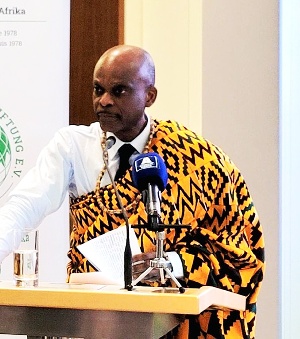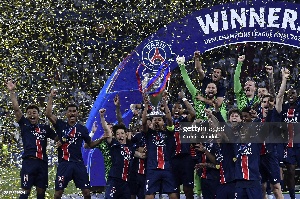- Home - News
- Elections 2024
- News Archive
- Crime & Punishment
- Politics
- Regional
- Editorial
- Health
- Ghanaians Abroad
- Tabloid
- Africa
- Religion
- Photo Archives
- Press Release
General News of Wednesday, 16 April 2025
Source: www.ghanawebbers.com
Togo’s Foreign Minister On A Crusade To Tell Africa’s True History
Robert Dussey and the Quest for True African History
An old African proverb states, "Until the lions have their own historians, the history of the hunt will always glorify the hunter." This reflects a reality in African history. Africans have not documented their past adequately. Consequently, colonizers have shaped Africa's narrative to fit their views. Togo’s foreign minister, Robert Dussey, aims to change this.
Dussey highlights that ancient Mali created a codified human rights law in the 13th century. This was long before France's “Declaration of the Rights and of the Citizen.” Unfortunately, Africa is often overlooked regarding the Charter of Manden. Historians describe it as a legal document from the Malian Empire that emphasized social harmony and environmental protection.
At the “London Conference: 125 Years Later,” Dussey stated that Africans knew about protecting rights. He argued that human rights did not originate in France as many believe. He urged Africa to teach children about the Charter of Manden proclaimed in 1236 during Sundiata Keita's enthronement.
The Manden Charter is one of the world's oldest constitutions. It was inscribed on UNESCO’s list of Intangible Cultural Heritage in 2009. Although the Mali Empire no longer exists, its principles are still passed down through generations.
The London conference is part of meetings leading up to December's 9th Pan-African Congress in Lome, Togo. Dussey said this Congress will address justice and equality for African people. He noted past gatherings strengthened demands against historical injustices.
Dussey emphasized Togo's commitment to reparation and reconciliation with its past. He believes humanity and equality are essential for future relations between peoples. On this anniversary, he reflected on early visionaries who sought unity among Africans against racism and oppression.
He acknowledged progress since 1900 but stressed that true victory over historical injustice remains elusive. The end of slavery and colonization is not enough; more work lies ahead.
Dussey asserted that reparations should be pursued through dialogue rather than violence. Akyaaba Addai-Sebo highlighted that Pan-Africanism opposes colonialism and seeks decolonization to restore humanity.
Barryl Biekman pointed out ongoing issues like Afrophobia despite anti-discrimination efforts worldwide. He proposed declaring 2026 a year for remembrance and renewal regarding racial justice.
Eric Philips from Guyana’s Reparation Committee stated accountability is crucial today, not just memory or guilt. After 125 years, Black people return to London as claimants for unfulfilled debts.
Laura Hammond from SOAS honored those who championed Black causes throughout history, including Walter Rodney’s work on slavery published in 1970. She emphasized SOAS's commitment to equitable partnerships with African universities.
Hammond noted Africa's potential due to its young population and abundant resources. SOAS aims to support education for future leaders through joint programs with various universities across Africa.
These initiatives provide vital educational opportunities for students who may struggle financially or logistically to study abroad in the UK.











